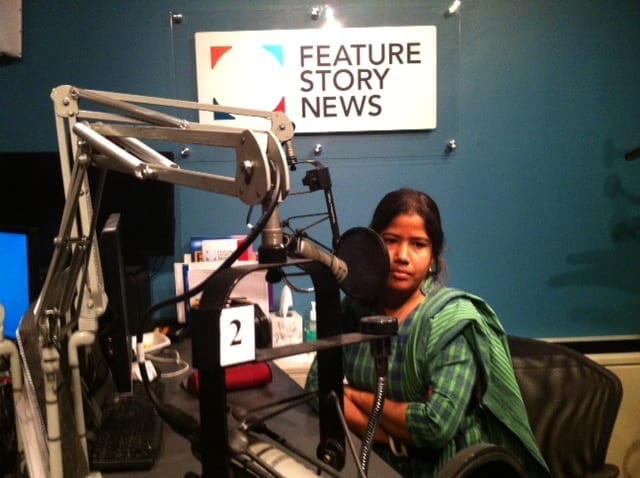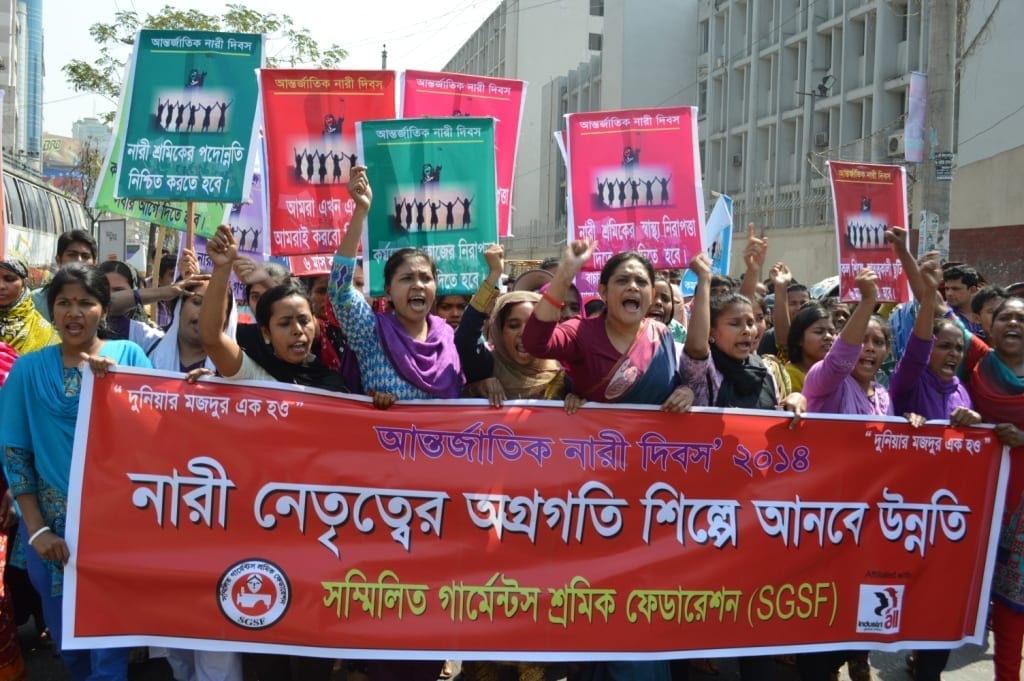
Jul 1, 2014
Miners, forklift drivers and other workers at ArcelorMittal in Liberia are seeking to close the wage gap between residents and expatriate workers, who can receive up to 10 times the salary for the same work.
But contract negotiations between the United Workers Union of Liberia Local 4 and ArcelorMittal have stalled, with management refusing to agree to the wage increase the workers’ are seeking. Luxembourg-based ArcelorMittal is the world’s leading mining and steel company and has operated in Liberia since 2006. In 2013, the corporation saw $6.89 billion in profits.
Recently, Solidarity Center Africa Region Director Imani Countess talked with UWUL Local 4 Secretary General Amos Monweh, who discussed how the issues involved at the bargaining table reflect the country’s greater struggle to generate good jobs for Liberians while attracting overseas investment. Monweh has worked at ArcelorMittal for nine years and was elected secretary general in 2012. The following is an edited version of Amos Monweh’s remarks.
Workers at Arcellor Mittal are demanding a 70 percent increase in wages so that the highest paid national staff is equal to the least paid expatriate.
Why is this important? Arcellor Mittal is the global leader in steel production. In Liberia, they help set the standards in terms of industry practice.
In ArcelorMital facilities, non-technical staff, including hospital workers, security staff and key positions in management are filled by expatriates from South Africa, the United Kingdom and India, as well as a number of countries in Africa.
Salaries and benefits for expatriates vary significantly. Such variance create a serious mis-alignment with higher wages, allowances and benefits going to expatriates but not to nationals with similar skills. For example, an expatriate mine superintendent may make $10,000-$15,000 per month, while a national will make approximately $1,000. This 10-fold difference creates a discriminatory pattern, in which Liberians are on the losing side.
Further, expatriates often are not required to pay taxes on their salaries, which reduces revenue flow to the Liberian government.
Firms are required to establish skills development plans, including sending Liberians abroad for training if necessary.
(“Liberianization,” the transfer of skills to nationals with the goal of reducing reliance on expatriate labor, is a government requirement. The Investment Incentive Act of 2010, popularly known as the Liberianization policy, sets aside 16 businesses exclusively for Liberians.)
With the first five years of a concession agreement (to a multinational company), plans should be in place so that skills are transferred to nationals within that time frame. Yet, these skill development plans are never put in place.
The union position is: Obey the law, enforce the concession agreement, or bring in Liberians. We will all make less money, but will ensure salary alignment, enhance skills and increase the number of decent jobs for Liberian nationals.

Jun 26, 2014
CHITTAGONG, BANGLADESH—In this coastal city of 6.5 million people, the second center of garment production in Bangladesh after the capital, Dhaka, a re-energized labor movement is making real progress in organizing workers. At a Solidarity Center training program for two trade union federations, 12 young organizers—most on the job for less than six months—were advancing beyond the basics of organizing and moving up the knowledge ladder fast.
It helped that two other attendees—Nomita, president of the Bangladesh Independent Garment Workers Union Federation (BIGUF), and her colleague, Chandon, BIGUF vice president, joined the training to support and inspire. Between them, they have two decades of experience organizing in a hostile environment, and have been instrumental in guiding the new activists into a ramped up, more strategic form of organizing.
This was not their first training program, and the organizers were delving into more sophisticated material, including chapter and verse on labor law, organizing women workers, developing leaders and representative unions, incorporating new tactics into campaigns and how to interview workers to document the unfair labor practices (including sexual harassment, firings, threats and violence) that they and their colleagues are facing on a daily basis.
Since the Tazreen Fashions factory fire of November 2013 through the end of May 2014, several independent unions including BIGUF and the Bangladesh Garment Workers Independent Federation (BGIWF), also represented at this training, have organized 251 unions, with 166 achieving registration, a government requirement. In all, the factory unions represent 75,000 workers. In Chittagong alone during this period, workers organized 45 unions with 34 gaining registration—a 79 percent success rate.
But organizing and registration is just the beginning for these brave workers. The next step is employer recognition. After that, unions will present a charter of demands (which might include items taken for granted in the West, such as payment of the minimum and overtime wages, and improved factory safety) to management to form the basis for collective bargaining. Then, hopefully, negotiations. Each step is difficult, but these new organizers are well aware how critical these benchmarks are to the lives and livelihoods of Bangladesh garment workers.
Jun 20, 2014
Thailand, Malaysia and Venezuela failed to comply with the minimum standards to address human trafficking over the past year, according to the State Department in its annual Trafficking in Persons Report (TIP) released today.
The three countries were downgraded from the department’s “Tier 2 Watch List” to “Tier 3.” Such a downgrade makes the countries liable to sanctions, which could include the withholding or withdrawal of U.S. non-humanitarian and non-trade-related assistance. The State Department is required by law to move countries off the Tier 2 Watch List after two years on the list (or four years with a waiver).
Migrant workers, primarily from Burma and Cambodia, work in slave-like conditions on Thai fishing boats, fueling the country’s $7 billion seafood export industry and making it the world’s third-largest exporter. Many migrant workers toil in forced labor and are held against their will on the boats where they are beaten and even killed. A recent Guardian series is the latest report on the horrors endured by migrant workers who often are tricked by labor recruiters and sold into bondage. Estimates of migrant workers in Thailand range from 200,000 to 500,000.
A survey by the International Labor Organization (ILO) last year of nearly 600 workers in the Thai fishing industry found that almost none had a signed contract, and about 40 percent had wages cut without explanation. Children were also found on board. A 2009 U.N. report found that about six out of 10 migrant workers on Thai fishing boats reported seeing a co-worker killed. In another report, migrant workers say they were trafficked and forced to work for up to 20 hours per day with little or no pay. Many migrant workers in Thailand are in debt bondage.
The Solidarity Center was one of the first organizations to publish a comprehensive report about labor exploitation in the Thai seafood industry back in 2007 entitled The True Cost of Shrimp.
The Solidarity Center works with several allied organizations in Thailand, including the Migrant Worker Rights Network (MWRN), to combat trafficking for forced labor. In April, the MWRN negotiated an unprecedented $1.67 million severance package for 1,200 laid-off Burmese migrant workers. The Solidarity Center provided the legal analysis and opinion that showed the workers’ employer was legally bound to pay severance to the migrant workers.
Also in April, the MWRN and the Human Rights and Development Foundation (HRDF), another key Solidarity Center partner, rescued a Burmese migrant worker who was sold and forced to work on a fishing boat. The MWRN and HRDF also contacted the police to rescue other trafficking victims from the fishing boat. The boat captain was arrested and the Solidarity Center is monitoring the police investigation to ensure all perpetrators are brought to justice.
Formed in 2009, the MWRN in recent years has focused on negotiating with employers for better wages and working conditions. In one instance, the MWRN negotiated commitments from employers to continue employing migrant workers with expired visas until they received new visas, rather than fire workers as employers had done.
The MWRN also secured commitments from the Thai government not to arrest migrant workers working on expired visas and to fine employers for firing such workers. The Solidarity Center provides support to the MWRN to educate migrant workers about their right to freedom of association. As a result, MWRN membership has grown from 700 to 3,000 in the past year.
The strong support for collective bargaining is also reflected in an ILO survey, which shows a majority of fishers interviewed—nearly 51 percent—say they are interested in union representation.
The Solidarity Center has for years promoted freedom of association as a key strategy for preventing human trafficking, forced labor and other forms of severe labor exploitation and the Trafficking in Persons report shows how much more needs to be done by the government to address labor trafficking.

Jun 13, 2014
More than 60 workers at a Bangladesh washing facility have been fired since late April and at least one union leader has been physically assaulted in what their union says is a campaign to end union representation at the plant.
The Sommilito Garments Sramik Federation (SGSF), which represents the workers at the Raaj RMG Washing Plant, says the incidents escalated after the union made a formal request to management in March to begin collective bargaining. The factory union was officially registered in January.
One worker, the union treasurer, was fired while she was pregnant—effectively ending her union activity and her maternity benefits, says SGSF. Replacement workers are reportedly being hired only on the condition that they not join the union, and false criminal charges have been filed against several one union and two members including the union’s general secretary, according to SGSF.
The Solidarity Center’s Dhaka office sent a letter to the Ministry of Labor and Employment on April 23 asking ministry officials to resolve the terminations, illegal under Bangladesh law, and SGSF and the plant union have filed formal labor complaints. To date, government agencies have not responded.
The plant, located in Gazipur, outside Dhaka, the capital, provides services to many garment factories in the area. Dozens of workers trying to form unions at garment factories also have recently been threatened with mass termination, beaten and kidnapped. Many of their lawful applications for new factory-level unions have been rejected for dubious reasons.
Following the Rana Plaza collapse in April 2013, and other high-profile catastrophes, the government showed signs of recognizing worker rights and its own labor laws, allowing workers to form their own unions. As a result, garment workers have registered more than 130 factory-level unions in the past year.
But the recent violence and retaliation against workers seeking to exercise freedom of association has gone unpunished, and SGSF and other garment unions say the government must do more to protect workers who form unions at their factories.
SGSF is calling for Raaj to immediately reinstate terminated workers with back pay and to bargain collectively with workers and the union. Further, SGSF is seeking for dismissal of the false charges against union activists.
Jun 13, 2014
June 16—Update: The Thai government has indicated it wants to reverse its decision.
June 13, 2014—Thailand’s State Enterprises Workers’ Relations Confederation (SERC) is expressing shock that the country’s new government was the only nation to vote against a new legally binding treaty requiring punishment of perpetrators of forced labor.
The International Labor Organization (ILO) on Wednesday approved a protocol that updates its Forced Labor Convention by requiring ratifying nations to identify and secure release of victims, ensure them access to compensation and punish perpetrators.
The action is [a] “most offensive action and damaging to Thailand’s reputation to the outside world,” SERC said in a statement. “SERC strongly opposes this inappropriate action from every related person who supported violations against worker’s rights and human rights.”
Thailand was the only country to oppose the protocol. Most Gulf countries abstained from voting.
An estimated 21 million workers toil in forced labor. A recent ILO report estimates that $150 billion in illegal profits are made in the private economy each year through modern forms of slavery.
This week in its “Modern-Day Slavery Series,” the Guardian profiled migrant workers trafficked to Thailand to labor on fishing trawlers. As the Guardian reported: “The Thai fishing industry is built on slavery, with men often beaten, tortured and sometimes killed—all to catch ‘trash fish’ to feed the cheap farmed prawns sold in the west.”



